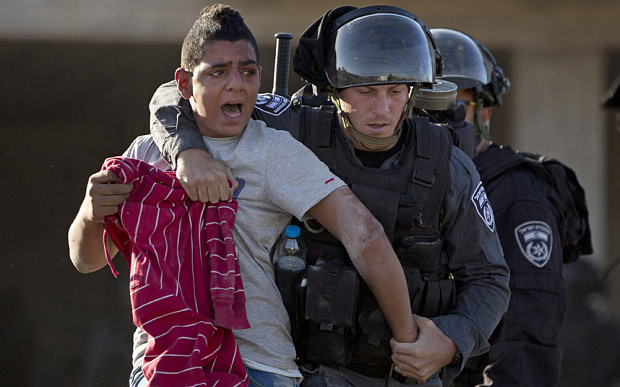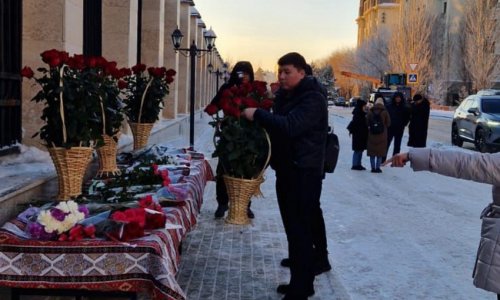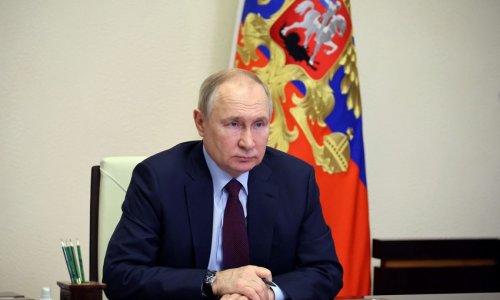"Today the law doesn't prevent me from raising the Palestinian flag," he said. "But if they pass this new law, I might not be allowed to do it any more. I might have to remove it and put it up inside my house instead. It will be painful."
Mr Amara, 35, an Arab-Israeli, was referring to plans to enact one of the most bitterly controversial pieces of legislation in Israel's 66-year history, which would officially classify the country as "the nation state of the Jewish people".
The proposal, championed by Benjamin Netanyahu, the prime minister, and approved by the cabinet last week, threatens to sink the governing coalition, with key ministers vowing to resign if it is passed..
Mr Netanyahu says it is essential to affirm Israel's Jewishness in the country's Basic Law – the Israeli equivalent of a constitution – as a definitive riposte to those whom he says refuse to accept Jews' right to live there.
But the proposal has split the Israeli political establishment and enraged Arabs amid criticisms that it promotes the country's Jewish nature at the expense of its status as a democracy, while reducing its 1.7 million Arab inhabitants – more than 20 per cent of the population – to second-class citizens.
Arab anger intensified last week when a separate anti-terrorism bill tabled by a backbencher in Mr Netanyahu's Likud party proposed outlawing the Palestinian flag and other "enemy" emblems at protests which turned violent.
Such changes touch a raw nerve in Kafr Kana, an Arab town of 22,000 in Israel's southern Galilee region, which saw rioting this month when a 22-year-old local man, Kheir al-Din Hamdan, died after being shot by police officers who said he had threatened them with a knife after they arrested his cousin. Their claims were undermined by CCTV footage which appeared to show Mr Hamdan trying to run away when he was shot.
In contrast to Palestinians in the occupied West Bank and Gaza Strip, Arabs living in Israel enjoy full citizenship and voting rights, although complaints of discrimination, unfair treatment and brutality at the hands of the police are widespread. Many Israelis, in turn, mistrust Arabs' loyalty to the state and suspect them of sympathising with the Palestinian cause.
While details of the planned legislation remain vague – last week's cabinet vote effectively approved three different versions – one certainty is that national rights would be reserved for Jews but denied to Arabs, who would only have individual rights.
In Kafr Kana, Mr Amara – whose shop sits just yards from where Mr Hamdan was fatally shot on November 7 – said the law would pave the way for a crackdown on Arabs, culminating in many being expelled from Israel, the land of their birth.
"After this law, you will see many Arabs [in Israel] filling the prisons because of their opposition. It's a prelude to transfer," said Mr Amara, a member of the Islamic Movement in Israel, a group Mr Netanyahu has accused of inciting violence and clamouring for the country's destruction.
"We fear it will lead to the withdrawal of citizenship and rights, the destruction of our towns and villages, and eventually, to transfer. It means they want to transfer us out of the country. But we will not leave. We were born here and will die here. The Palestinian refugees who live in Arab countries live under constant humiliation but we will not accept such a fate."
Fears of mass expulsion – widely expressed in Kafr Kana – have been fuelled by Mr Netanyahu's comments in response to the violent demonstrations that followed Mr Hamadan's shooting.
"To all those who demonstrate against Israel and in favour of a Palestinian state, I invite you to move there; we won't give you any problem," the prime minister said, having earlier vowed to revoke the citizenship of those who campaigned against Israel's existence.
Prospects for a population transfer seemed to increase last week when Avigdor Lieberman, the Israeli foreign minister, who has railed against Israeli-Arabs flying the Palestinian flag, proposed "economic incentives" to encourage Arabs to move to a Palestinian state as part of a future peace deal.
Arab residents in the flashpoint Israeli town of Kafr Kana fear mass expulsion if a controversial new law designating the country a Jewish state is approved
A Palestinian protester kicks a flaming tyre towards Israeli security forces during clashes in the West Bank Photo: JAAFAR
The idea, published in a manifesto for Mr Lieberman's party, Yisrael Beitenu, extended his existing plan for land swaps, under which Arab areas bordering the West Bank would be transferred to a new Palestinian state, while Israel received Jewish settlements in the territory in return.
Transfers could also apply to other towns not abutting occupied Palestinian territory – which would include Kafr Kana – to "allow Israeli-Arabs who do not identify with the State of Israel to become part of the Palestinian state ", Mr Lieberman wrote.
(telegraph.co.uk)
ANN.Az
Follow us !











